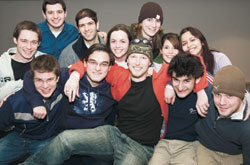Technology put to work for developing countries
Engineers Without Borders conference on UN goals

Members of Engineers Without Borders meet before heading off to the organizationís fifth annual conference that recently took place in Ottawa. Front row, from left: Patrick Cristofaro, Farhad Agzamov, Jon Pallett, Anis Khan and Rob Austen. In the back, from left: John Baynton, Eval Azran, Georges Mikhael, Diane Cousineau, Andrea Spector, Emilie Lapointe and Sabahat Naureen.
Photo by andrew dobrowolskyj
Twelve Concordia Engineering students attended the fifth annual Engineers Without Borders (EWB) National Conference, held Jan. 18 to 21 in Ottawa.
The aim of this year’s event, “Looking Back and Moving Forward,” was to analyze how to meet the United Nations’ Millennium Development Goals.
Launched in 2000, the goals seek, among other things, to halve global poverty and ensure every child has access to primary education by 2015. At the current rate, critics say these targets will not be met.
Delegates from 22 chapters attended workshops about private sector development, the World Trade Organization, fair trade products and ethical tourism to learn how to raise awareness and encourage change.
“Engineering is about applying the technical knowledge we’ve learned to help people. We’ve seen that development doesn’t work unless you take a sustainable approach,” said fourth-year Mechanical Engineering student Jon Pallett.
“Working to meet short-term goals may help people now, but won’t necessarily lead to a lasting solution.”
The keynote speaker was Lt.-Gen. (Ret’d) Roméo Dallaire, who headed the UN’s mission in Rwanda during the ’90s.
A high point for second-year student Patrick Cristofaro, however, was listening to the experiences of other students who have recently returned from internships abroad. He too hopes to take his skills across borders before he completes his degree.
Diane Cousineau, president of the Concordia chapter, spent nearly four months in Mali last summer. She interned with a British NGO, WaterAid, which helps ensure a steady supply of potable water to communities.
She said the work was rewarding, but it was a challenge to learn how to work in a culture with different norms.
“Things are done at a different pace. In Canada, we’re used to fax machines, cell phones, strict deadlines and receiving answers right away. It was really frustrating at the beginning. But you adapt.”
She and Pallett agreed internships are a superb way for students to develop their “soft skills,” such as effective communication and team-building, which new graduates usually don’t get to do in a corporate milieu.
Andrea Spector worked in Senegal last summer with an NGO in cashew-nut processing and micro-scale irrigation.
The Concordia chapter also recently received a visit from McGill graduate Louis Dorval, one of the founders of Scala, an information technology project that provides 15 communities in the Philippines with life skills and computer literacy training.
The EWB-administered project has won several awards, including a UN Global Knowledge Youth Education Award at that organization’s World Summit on the Information Society, held in Geneva in 2003.
Engineers Without Borders has a membership of nearly 4,000 students nationwide. Last summer, it sent 35 delegates on internships in developing countries. For more information on its accomplishments and activities, please visit http://concordia.ewb.ca.
